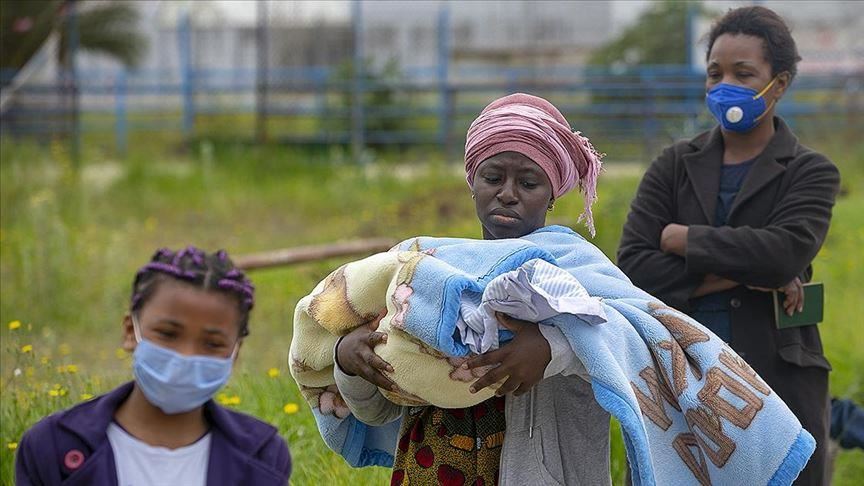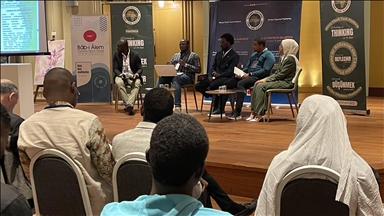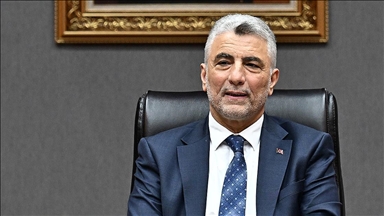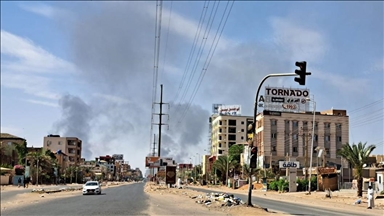ANALYSIS - Potential consequences of COVID-19 pandemic in Africa
Over 3 million may lose their lives due to lack of healthcare, financial support

The writer is the director of the Institute for Eastern and African Studies in Turkey's Social Sciences University of Ankara (ASBU).
ISTANBUL
The most developed economies in the world faced a major health crisis due to the new coronavirus (COVID-19) pandemic. Despite their technological economic advantages, countries such as the US, China, the UK, Spain, and Italy are struggling to put an end to the spread of the virus. Even with all the effort put in, tens of thousands are losing their lives in these countries, as the virus continues to spread.
While scientists are putting enormous amounts of effort into developing a treatment to and a vaccine for this disease, all eyes are on the African continent which has a weak economy and health industry. The developments that might take place in Africa is followed closely by the whole world. This is a major source of anxiety for many due to the possibility of underdeveloped African countries not being able to fight the virus. People are afraid of the horrific destruction potential of the virus in such countries in case of the virus spreading to a wide section of societies in the continent. So the UN Economic Commission for Africa, in its report regarding the effect of the pandemic on the economy and social life, announced that the COVID-19 pandemic might end up taking the lives of between 300,000 and 3.3 million people in the African continent if necessary measures are not taken. The report highlighted that the continent’s economy will take a major hit from the pandemic, even if the virus is taken under control.
But despite these terrifying predictions, it is observed that the numbers of cases and deaths in African countries are quite low compared to other countries, so far. The World Health Organization (WHO) has reported that the total number of cases in the entire continent has reached 19,895, and the number of deaths has surpassed 1,000 as of April 17. While the total numbers are lower, the death-to-case ratio is significantly different in the continent, compared to other countries. For instance, while the number of reported deaths per case is at around 2.5% in Turkey, that ratio is 4.3% in Africa. It is thought that the difference is caused by insufficient healthcare on the continent.
It is still unknown whether the reason for lower numbers in the African continent is the lack of testing or that the virus is truly not affecting as many people in the region. There is currently no tangible evidence on it. This situation is supposed to be worrying if the lower numbers are due to the lack of testing as its consequences will be apparent in no time, and the true dimensions of the pandemic will surface.
African countries facing such a situation is truly worrying. Particularly, sub-Saharan African countries lack the opportunities and required healthcare sector to fight the disease. Most African countries are facing the same threat. The spread of the virus might be catastrophic. The reasons for this may be listed as follows:
- The main reason for the fast spread of this virus is shown to be the ease of transmission from one person to another. Avoiding interpersonal contact, practicing social distancing as much as possible and similar precautions are very important. According to a WHO report, 56% of the African population is living in densely populated residential areas, which makes it harder to practice social distancing within the continent.
- The governmental units in African countries not having necessary financial resources is another reason for their inability to fight the spread of the virus to a large number of people. It is known that most of these countries do not have sufficient number of medical masks, clothing, respiratory devices, and medicine.
- While there is no specific approach for the treatment of this disease, hospitals provide breathing support, and use certain treatment methods to boost the immune systems of their patients. It is known that hospitals in many African countries are not capable of giving such support. Poor hygiene in hospitals and especially the lack of intensive care units, as well as other similar shortcomings, can be considered among the major disadvantages of African countries in fighting this disease.
- Experts say hand washing and hygiene are extremely important in preventing this disease. A significant portion of the people in the region -- especially those living in camps -- being deprived of a hygienic environment is also particularly dangerous, in that sense. The WHO report mentioned above reported that 36% of the African population does not even have the opportunity to wash their hands.
- The places where a significant part of the people live on the continent have impossibilities making it difficult for the people to protect themselves from the disease. In many homes, sinks, soaps, cleaning materials, and similar products are not available in sufficient quantities. The extent of the danger posed by this issue will be better understood if the statement of the UN Children's Fund (UNICEF) reporting that 3 billion people worldwide do not have a sink to wash their hands with water and soap, one-third of the schools do not have washbasins where children can wash their hands, and 16% of health centers do not have functional toilets and washbasins are considered.
- A large portion of the people living in Africa does not have access to masks and similar protective material, fruits, and vegetables or other food that strengthens immunity. This situation will be a very important factor in the case of a potential major outbreak.
- What’s more dangerous than all of this is the lack of awareness among the people of the continent. In many countries, people are not avoiding social contact despite the warnings. Some African countries are forcing people to take precautions in public using weapons, whips, and tear gas. During such precautions, there have been deaths. Eight people lost their lives during the intervention of the police against people who were not obeying the curfew in effect since March 26 in South Africa, where the greatest number of COVID-19 patients have been reported in the continent.
- On another note, 71% of the African workforce is made up of unregistered employees. Such measures taken will cause most informal workers to lose their jobs. Those who are not able to work from home will face major financial difficulties. Most African countries are not in a position to support these people financially, which will be a major roadblock to implementing isolation-related precautions.
In opposition to these negatives, some factors also give us hope. It is possible to list these points as in the following:
- African countries generally have a warm climate. The central region of the continent, especially, has the hottest climate in this period. Although healthcare professionals do not explicitly talk about the existence of an interaction between the spread of the virus and air temperature, they do not exclude the preventative role that higher air temperature may play in this outbreak. Some studies show that the sun or high temperatures, in general, are possibly unfavorable conditions for the virus. This is hopeful for the spreading rate of the virus since the temperature is generally very high in the African continent during this season. Considering the insufficient healthcare sector and measures in the continent, this factor is expectedly prominent.
- It is also possible that the genetic makeup or the immune systems of the people in the region play a role against the spread of the virus. The people in the region may have possibly developed a significant amount of immunity to the virus after exposure to virus outbreaks like Ebola, swine flu, SARS, and MERS in the previous years since these viruses are from the same family. Malaria, especially, is very common in the continent and almost anybody gets this disease, at least once in their lifetime. Many people have been vaccinated and used drugs against these diseases. This may have rendered the people of the region immune to such viruses. This argument is strengthened by the fact that malaria medication is used in the treatment of this virus in some countries.
- One of the advantages of the continent is that the majority of its population is young. Approximately 60% of the continent's population is made up of young people. Experts argue that among those who suffer from this disease, young people are at a lower risk. Even if they contract the virus, most recover without any symptoms, and fatalities occur mostly among older patients. The continent's young population structure might be helping them survive this outbreak with less damage.
In conclusion, it is uncertain what the consequences of this pandemic will be for the African continent. Although the climate conditions, young population structure, and the immunity history of its people give some hope, it is obvious that the continent will face a great danger otherwise. It will not be possible for the world to overcome this crisis alone or with measures targeting only their own people. It also constitutes a significant handicap that developed countries are neglecting Africa while focusing on their problems due to the outbreak. The WHO reducing the amount of support provided to Africa due to challenges faced by the organization itself may also cause major problems. US President Donald Trump's announcement that the US will cut the funds provided to the WHO will significantly affect the operational strength of the organization. But the fight against this disease is a global one, and it requires solidarity. It is crucial for the global success of this fight that developed countries do not leave African countries to their own fate. Otherwise, while these countries will be able to get the virus under control within their borders, it will not be easy to contain and eradicate the virus globally.
* Opinions expressed in this article are the author’s own and do not necessarily reflect the editorial policy of Anadolu Agency.
* Translated by Can Atalay
Anadolu Agency website contains only a portion of the news stories offered to subscribers in the AA News Broadcasting System (HAS), and in summarized form. Please contact us for subscription options.






